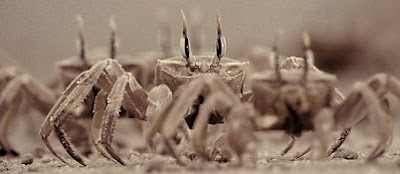
I first encountered the poem “Ghost Crabs” by Ted Hughes in the autumn of 1968, the year after it was published in Wodwo. I was preparing for A-levels at the time, and our European History teacher (who liked to read and write poetry) read it aloud to his class.
Ted Hughes was one of the great poets of the 20th century, and this is one of his finest poems. It reminds the reader that the larger forces of history are mysterious and inscrutable. They are inaccessible to the understanding of mere mortals whose lives make up the warp and weft of their fabric.
No one woke up one morning and said, “Hey! Look! The Middle Ages are over, and the Renaissance is here!” No one sat down and decided to start the Industrial Revolution.
The historical currents that agitate us, wrack us, and tear our lives apart are unavailable for our examination. Anyone who says he understands the historical moment in which he lives is either deluding himself or hoodwinking his audience. All predictions of what lies more than a few years ahead are suspect. None of us has a clue of how our own times fit into the larger picture — which will be named and systematized fifty, a hundred, or a thousand years from now.
That’s what this poem means to me. It’s a call for ontological humility.
Ghost Crabs
by Ted Hughes
At nightfall, as the sea darkens,
A depth darkness thickens, mustering from the gulfs
and the submarine badlands,
To the sea’s edge. To begin with
It looks like rocks uncovering, mangling their pallor.
Gradually the labouring of the tide
Falls back from its productions,
Its power slips back from glistening nacelles, and
they are crabs.
Giant crabs, under flat skulls, staring inland
Like a packed trench of helmets.
Ghosts, they are ghost-crabs.
They emerge
An invisible disgorging of the sea’s cold
Over the man who strolls along the sands.
They spill inland, into the smoking purple
Of our woods and towns — a bristling surge
Of tall and staggering spectres
Gliding like shocks through water.
Our walls, our bodies, are no problem to them.
Their hungers are homing elsewhere.
We cannot see them or turn our minds from them.
Their bubbling mouths, their eyes
In a slow mineral fury
Press through our nothingness where we sprawl on our beds,
Or sit in our rooms. Our dreams are ruffled maybe.
Or we jerk awake to the world of our possessions
With a gasp, in a sweat burst, brains jamming blind
Into the bulb-light. Sometimes, for minutes, a sliding
Staring
Thickness of silence
Presses between us. These crabs own this world.
All night, around us or through us,
They stalk each other, they fasten on to each other,
They mount each other, they tear each other to pieces,
They utterly exhaust each other.
They are the powers of this world.
We are their bacteria,
Dying their lives and living their deaths.
At dawn, they sidle back under the sea’s edge.
They are the turmoil of history, the convulsion
In the roots of blood, in the cycles of concurrence.
To them, our cluttered countries are empty battleground.
All day they recuperate under the sea.
Their singing is like a thin sea-wind flexing
in the rocks of a headland,
Where only crabs listen.
They are God’s only toys.

1 comments:
A related poem by Hughes is equally resonant, especially the highlighted last couplet, which says it all.
RELIC
I found this jawbone at the sea's edge
There, crabs, dogfish, broken by the breakers or tossed
To flap for half an hour and turn to a crust
Continue the beginning. The deeps are cold:
In that darkness camaraderie does not hold.
Nothing touches but, clutching, devours. And the jaws
Before they are satisfied or their stretched purpose
Slacken, go down jaws, go gnawn bare. Jaws
Eat and are finished and the jawbone comes to the beach:
This is the sea's achievement, with shells
Vertebrae, claws, carapaces, skulls.
Time in the sea eats its tail, thrives, casts these
Indigestibles, the spars of purposes
That failed far from the surface, none grow rich
In the sea. This curved jawbone did not laugh
But gripped, gripped, and is now a cenotaph.
__________________________________
Post a Comment